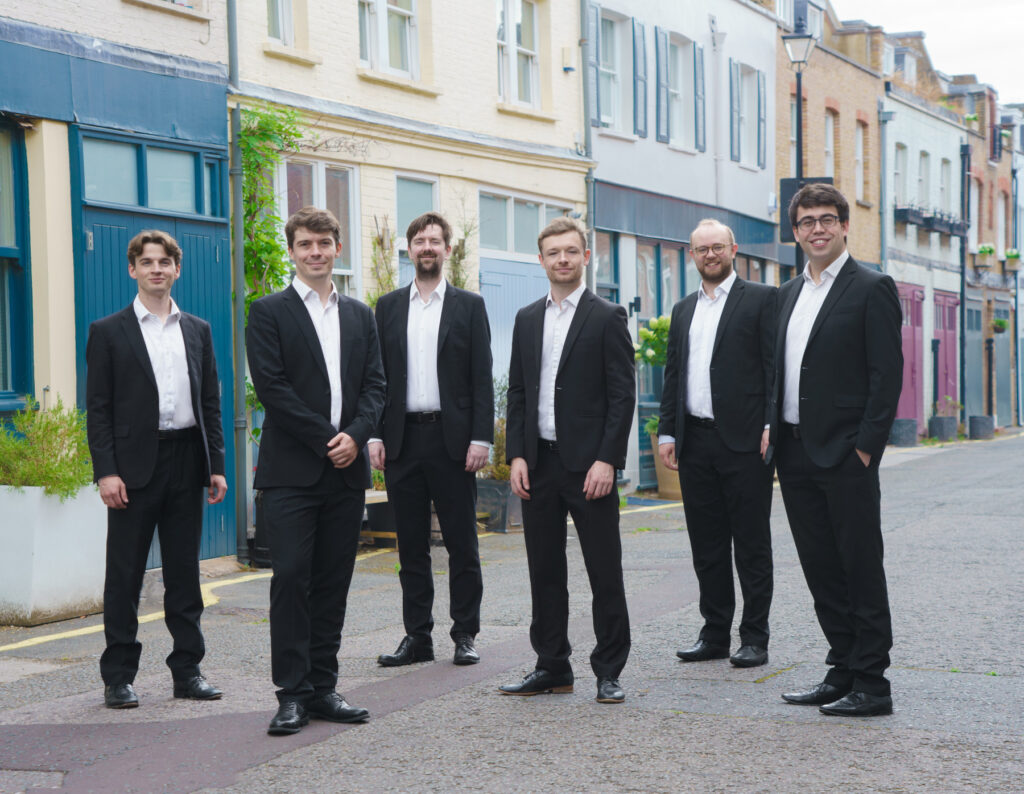You can count on the fingers of one hand those a cappella vocal groups within the UK that come close to the finesse of The Gesualdo Six. In terms of formidable technique and sheer beauty of tone, and with impeccable tuning, blend and balance taken for granted, this internationally acclaimed six-voice ensemble is the real deal.
Under the discreet direction of Owain Park, the group made clear its artistry at the church of St Cross in a seasonal programme entitled, O Magnum Mysterium combining settings of ancient and modern texts traversing Advent to Epiphany. Of those belonging to the Renaissance, it was the five voice motet Mirabile mysterium by the prolific Jacobus Handl whose setting of the ‘wondrous mystery’ left an indelible impression. Its mystical connection between the human and the divine is strikingly expressed through rising chromaticisms and bold harmonic juxtapositions, something that may have alarmed its earliest listeners. No less prolific a composer was Orlande de Lassus whose output accounts for a staggering three-fifths of all music printed in Europe between 1555 and 1600. His Tribus miraculis, an Epiphany setting and one of over 150 motets for five voices, celebrates the three signs of Jesus’s divinity. Here, its sense of jubilation was perfectly captured with lines of flowing polyphony that culminated in no fewer than fifty-two repetitions of the word ‘Alleluia’.

One of the earliest known Christian hymns, Conditor Alme Siderum, familiar to many as ‘Creator of the stars of night’, formed a second Lassus setting, this time an anonymous 7th century text traditionally sung during Advent. Its poignancy and timelessness were beautifully caught in alternating verses for solo voice (a warmly expressive countertenor) and full ensemble, bringing an individual and collective vocal colouring. Its sense of devotion was shared in Nun Komm, der Heiden Heiland, a vibrant hymn adaptation by Michael Praetorius whose setting of Martin Luther’s text is notable for its dramatic rhetoric, imitative textures and accumulating excitement in anticipation of the Virgin birth. Praetorius is widely associated with Es ist ein Ros’ entsprungen, and its flawless rendition here was an apt mirror for the purity of a rose springing from the stem of the Tree of Jesse.
From another master polyphonist, William Byrd’s Rorate Coeli, conceived as an introit for the votive Mass of the Blessed Virgin Mary, was unfailingly polished. A feeling of longing for the Saviour was given ardent expression in shapely phrasing, its trio passage at ‘Benedixisti, Domine’ spellbinding for its comforting reassurance of Christ’s arrival on earth.
Arguably, the high point of the early settings was a stunning rendition of the much-loved medieval carol Angelus as virginem. Set in motion by Joseph Wicks and joined by Josh Cooter, the two tenors achieved a remarkable synchronicity, with voices exquisitely blended and both projecting the text’s ecstatic evocation.
Contemporary settings included Sally Beamish’s peerless carol In the stillness (text by Katrina Shepherd), its perfect marriage of words and music bringing an unvarnished portrait of a snowbound parish church, and by extension the humble nativity scene of Christ’s birth. Equally compelling was Judith Bingham’s haunting In Mary’s Love whose text by Ben Kaye draws inspiration from a Marian homily given by the 12th Century Cistercian Amadeus of Lausanne. The Gesualdo Six clearly have this work in their bones and revelled in its ethereal harmonies (notably the magical chords at ‘Wondrous newborn life rejoice’) and the skilful integration of solo voices within full textures, the whole despatched with demonstrable poise.
And it was with considerable poise that Holst’s In the bleak midwinter was sung; the quiet melancholy of Christina Rossetti’s text was tenderly realised, and its final verse intimately expressed by a solo voice above gentle humming. Words from Psalm 42 provided the inspiration for Owain Park’s ‘O send out thy light’ where pleas for divine light are made to guide the shepherds. Suffused with a gentle astringency, the six voices fashioned just the right degree of warmth to evoke awestruck devotion.
The evening was bookended by two works associated with the Choir of King’s College Cambridge; David Willcocks’s arrangement of Palestrina’s Matin Responsory and Bob Chilcott’s ‘The Shepherd’s Carol’ composed for the choir in 2000 – its music staying with me long after its final chord. Altogether, an evening of superb music making, summed up by a friend who commented “There simply aren’t enough superlatives to describe this group”. With performances as stylish as this, it’s little wonder that Gesualdo Six sing to full houses.
David Truslove
The Gesualdo Six
Owain Park – artistic director & bass; Alasdair Austin – countertenor; Guy James –countertenor; Josh Cooter – tenor; Joseph Wicks – tenor; Michael Craddock – baritone
Palestrina – Matin Responsory; Lassus – Conditor alme siderum; Praetorius – Nun komm, der Heiden Heiland a6; Beamish – In the stillness; Handl – Mirabile mysterium; Plainchant – Rorate caeli; Byrd – Rorate caeli; Holst – In the bleak midwinter; Eccard – Maria wallt zum Heiligtum; Poulenc – O magnum mysterium; Praetorius – Es ist ein Ros entsprungen; Anon – Angelus ad virginem; Bingham – In Mary’s love; Plainchant – Vidimus stellam; Lassus – Tribus miraculis; Park – O send out thy light; Chilcott – The Shepherd’s Carol
The Church of St Cross, Winchester, 19 December 2024
All photos by Ash Mills
.